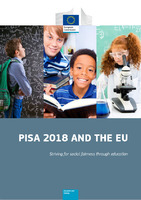Pisa 2018 and the EU, Striving for social fairnessthrough education

COM Document
Author
European Commission
Date
2019View/
Subject headings
International Student Assessment ; Underachievement in readingAbstract
The OECD ‘Programme for International Student Assessment’(PISA) tests reading, mathematics and science performance of 15-year-old pupilsacross the world. It takes place every three years and the 2018 wave has a special focus on reading. In an EU perspective, PISA results are particularly important because they feed into the strategic cooperation framework ‘Education and Training 2020’(ET2020). They are the basis for one of the ET 2020 benchmarks:the rateof underachieversin reading, mathematics orscience among 15 year-olds in the EU should be less than 15% by 2020. Underachievers in PISA are thosepupilswho fail to reach the minimum proficiency level necessary to participate successfully in society.PISA also makes it possible to analyse national performance by gender, socio-economic status and immigrant background, and contains other contextual information on the school environment and pupils’ attitudes, such as their plans for further education, their assessment of their own exposure to bullying and sense of belonging at school.Overall, PISA 2018 results leave no room for complacency. The continuedhigh share of underachievers at EU level is both a worrying social issue and a drag on EU future economic competitiveness. Fighting underachievement continues to bea priority for the EU when it comes to striving for social fairness
Number of pages
37p.Language
EnglishDescription
The reuse policy of European Commission documents is regulated by Decision 2011/833/EU (OJ L 330, 14.12.2011, p. 39doi:10.2766/964797
NC-02-19-903-EN-N
